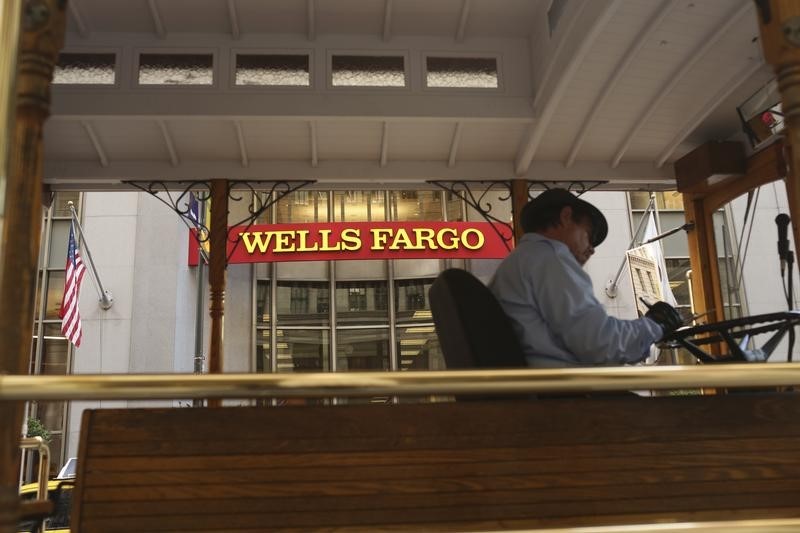By Geoffrey Smith
Investing.com -- Earnings from three of the U.S.'s biggest retail lenders all exceeded expectations in the first quarter, offering some reassurance for the coming earnings season after a disappointing lead from bellwether JPMorgan (NYSE:JPM) on Wednesday.
Wells Fargo (NYSE:WFC) said adjusted earnings per share were 88c in the quarter, some 10c higher than forecast, while PNC Financial (NYSE:PNC) beat expectations by over 20% and US Bancorp (NYSE:USB) beat by 5%.
However, initial reactions to the announcement were negative, as participants focused instead on the fact that Wells Fargo's revenue - arguably a better reflection of ongoing trends in its everyday business, fell short of expectations at $17.59 billion. Analysts had expected on average $17.8 billion. Both figures were down from an exceptional first quarter a year ago.
Wall Street's blue-bloods also managed to deliver a positive surprise: Morgan Stanley (NYSE:MS) and Goldman Sachs both reported annual declines in profit, but both banks' numbers came in ahead of expectations.
Goldman's (NYSE:GS) earnings per share fell 43% on the year to $10.76, while revenue fell by just over a quarter to $12.93 billion. For Morgan Stanley (NYSE:MS), the decline in earnings was a gentler 7%, while revenue fell 6% to $14.8 billion. For both banks, somewhat better-than-expected trading results helped to offset a sharp decline in revenue from dealmaking.
Citigroup (NYSE:C), meanwhile, also reported a 44% drop in earnings but it, too, performed better than expected, thanks largely to its consumer lending and credit cards business.
“We like where this business is headed," Citi CEO Jane Fraser said. She acknowledged however that the bank's efforts to scoop up more wealth management mandates from the ultra-rich around the world had suffered due to "geopolitics".
On Wednesday, JPMorgan stock had finished at a 52-week low after it reportedmp a 42% year-on-year drop in net profit. While that had been largely expected, the reality of cooling financial markets and a warning about future uncertainties from CEO Jamie Dimon both weighed heavily on the stock's performance.
As with Dimon, Wells's CEO Charlie Scharf warned that the Federal Reserve's planned monetary policy tightening and the Ukraine war represented substantial risks to the outlook.
"Our internal indicators continue to point towards the strength of our customers’ financial position, but the Federal Reserve has made it clear that it will take actions necessary to reduce inflation and this will certainly reduce economic growth," Scharf said in a statement. He added that he expected a rise in credit losses from their current level, which are low by historical comparison. The bank released a net $1.1 billion in provisions for credit losses in the quarter as the risks related to the pandemic faded.
